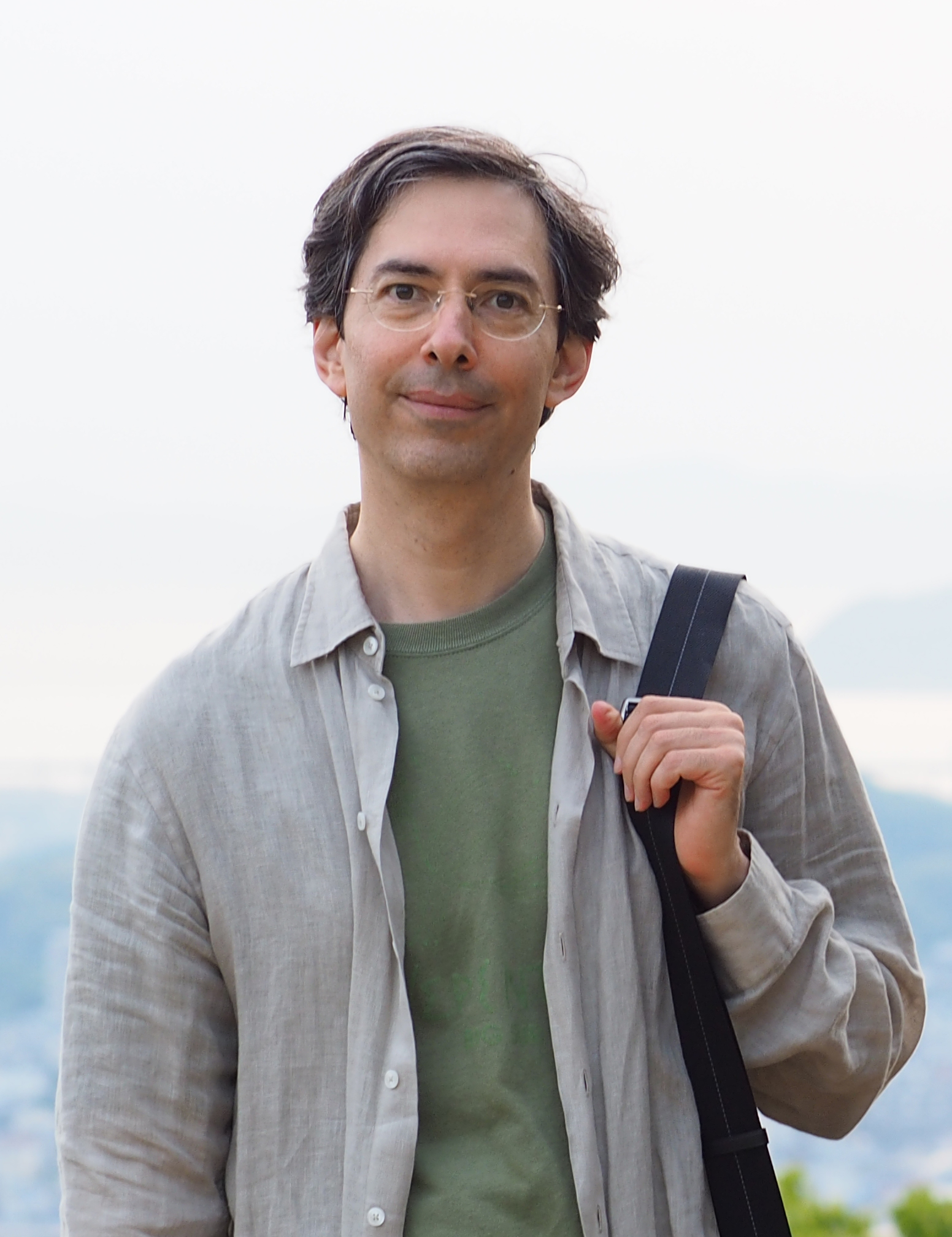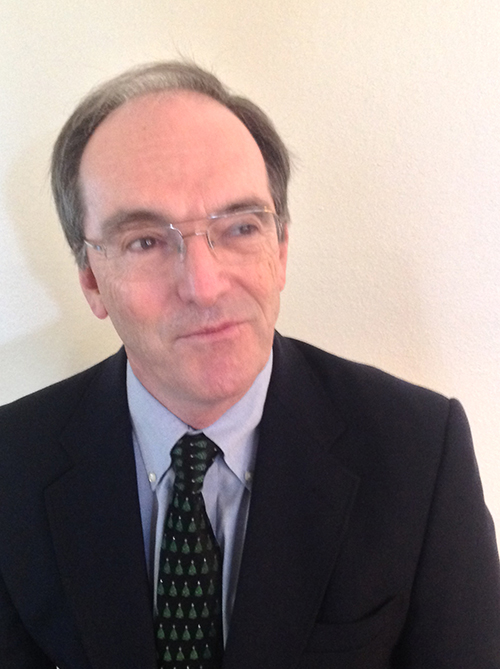
Japan Study Award
Edward Marx (Associate Professor,Ehime University)
“Leonie Gilmour: When East Weds West” (Botchan Books,2013)
Recipient’s remarks

I’ve been working on a book on the Japanese poet Yone Noguchi for about twenty years now, and since few people recall anything about him other than the name of his son, Isamu Noguchi, I was excited when I heard a few years ago that a film was being made about Leonie Gilmour, Yone’s some-time partner and Isamu’s mother. I had acquired some of Leonie Gilmour's manuscripts and already knew much about her life, but a book about an artist’s mother would have been a hard sell without this rare opportunity of a film to create interest.
The director, Hisako Matsui, traveled around Japan tirelessly giving speeches and attending fundraising dinners, inspiring thousands of supporters to contribute and participate in her “MyLeonie” film project, and I joined in and took advantage of the participatory atmosphere to persuade some friends to help me translate the book into Japanese.We learned some hard lessons along the way. One was that film fans don’t always appreciate having the colorful world of their favorite film spoiled by the faded monochrome truth. Another was that for publishers, a book’s connection to an upcoming film with uncertain prospects is not a great selling point, and an already-released film is even less of one.
The difficulty finding a publisher didn’t surprise me after years of working on obscure writers like Yone Noguchi; I had already made my own arrangements for the English edition, bypassing the slow university presses. But the translators were determined to find a publisher for the Japanese edition with a good reputation and get funding if possible, and the search dragged on for several years. By the time the translation came out we had lost most of the cheerful optimism we had at the beginning.
The business of so-called scholarly books seems a somewhat sad one these days. Authors spend years researching and writing and are then asked to subsidize publishing costs; publishers have a hard time breaking even and spend as little as possible on editing and promotion. It is a small miracle for a good scholarly book to be written, a somewhat larger miracle for it to be found and bought, and a still larger one if it’s actually read and appreciated. To win an award for a scholarly book is something truly beyond the bounds of expectation, the kind of miracle one feels fortunate to see once in a lifetime.
I hope this Mari Terada award will be an inspiration not just to me but to everyone who spends their time researching and writing for the sake of a few readers. It is a reminder that miraculous readers do exist, that there are people who value the efforts we make researching and writing, that, in short, there is a brighter side to scholarly publishing.
One of the more difficult questions we faced in making the translation of the book was whether to target it toward general readers or academics. I thought we shouldn’t have to choose, that we could make a book for all readers. The Mari Terada Prize makes me feel that was the right goal to pursue. I really want to thank the translators for their immense labors in bringing this book to a larger Japanese audience, and to the Japan Institute for National Fundamentals, for finding some merit in our work.
Recipient’s biography
Edward Marx was born in Los Angeles, California in 1963. He graduated from the University of California, Berkeley with a degree in English, and received a PhD in English from the City University of New York Graduate School in 1995. After a year as a Visiting Assistant Professor at the University of Minnesota, he was a Visiting Lecturer at Kyoto University for five years. After returning to California where he published his first book, The Idea of a Colony: Cross-Culturalism in Modern Poetry (University of Toronto Press, 2004), he became an Associate Professor in the Faculty of Law and Letters at Ehime University, Matsuyama, where he remains today. He has also taught at the City College of New York, Nara Women’s College, Kobe University, and the University of Kochi. He began working on Japanese poet Yone Noguchi while writing his dissertation, and has since published numerous articles on Noguchi and his family as well as two edited collections and the book Leonie Gilmour: When East Weds West (Botchan Books, 2013).
Japan Study Encouragement Award
David Hanlon (Professor, University of Hawaii)
“Making Micronesia : A political biography of Tosiwo Nakayama” (University of Hawaii Press,2014)
Recipient’s remarks

I am honored to be chosen as the recipient of the 2015 Japan Study Encouragement Award for my book Making Micronesia: A Political Biography Of Tosiwo Nakayama. I wish to express my gratitude to the Board of Directors of the Japan Institute for National Fundamentals. I am pleased that they have found the story of Tosiwo Nakayama, the first president of the Federated States of Micronesia (FSM), to have meaning and relevance to the study of Japanese history. I also wish to acknowledge the support of Professor Emeritus George Akita of the University of Hawaii at Mānoa. With this award, I intend to continue promoting a broader, more regionally based approach to the study of Pacific pasts that links islands to bordering continents and nations.
Born to a Japanese father and an island woman in 1931 on the small island of Piserach in Namonuito Atoll that lies to the northwest of the main Chuuk Lagoon group, Nakayama grew up during Japan's colonial administration of greater Micronesia and later proved adept at adjusting to life in post-war Chuuk under the American-administered Trust Territory of the Pacific Islands. A proponent of independence, Nakayama was a key player in the lengthy negotiations with the United States government that culminated in the Compact of Free Association and the eventual creation of the FSM. In 1979, Nakayama was elected first president of the FSM and spent the next eight years working to solidify the foundations the new island nation.
Japan figures prominently in the life history of Tosiwo Nakayama. His father Masami came from the Yokohama area where he was deeply affected by the international character of that major port city. Tosiwo Nakayama traveled to Japan on numerous occasions for both diplomatic and personal reasons. Japan proved an important source of foreign aid and diplomatic recognition in the early years of the FSM. The Compact of Free Association with the United States aside, the FSM received its first foreign assistance from the government of Japan in 1981. Japan was also the first country to negotiate fishing agreements with the FSM under the terms of the Law of the Sea Treaty to which the FSM was a signatory.
The fact that Nakayama grew up during Japanese times in Micronesia makes him a particularly appropriate subject for anyone interested in comparative colonialism and the history of Japanese migration and settlement in the Pacific region. The expansiveness of the world in which he lived, worked, and traveled defies colonially imposed boundaries and periods of history. His life was about linkages and connections, past and continuing. Tosiwo Nakayama’s life also invites a consideration of not only his ancestral links to Japan and Japan’s links to the islands, but also Japan’s identity as an island nation. Such an approach also encourages the larger world to consider the complexities of Japan’s relationship with the islands called Micronesia, and beyond the narrative of war and the simple histories of victory and defeat engendered by that narrative.
Recipient’s biography
Born in 1948, David Hanlon, a former director of the University of Hawaii at Mānoa's Center for Pacific Islands Studies, first came to the Pacific in 1970 with the Peace Corps. He and his wife Kathy served on the island of Pohnpei until 1973 as English language teachers in the village of Wone. They returned to the island in 1977 where they taught at the Community College of Micronesia in Kolonia Town until 1980. While on island, Hanlon served as an advisor to the local historic preservation program and conducted an archaeological inventory of historic properties in the greater Kolonia area. He holds an MA degree in international relations from the Johns Hopkins University's School of Advanced International Studies (SAIS) and a doctorate in Pacific Islands history from the University of Hawaii at Mānoa (UHM).
Hanlon is the author of Upon a Stone Altar: A History of the Island of Pohnpei to 1890 and Remaking Micronesia: Discourses Over Development in a Pacific Territory, 1944-1982. His most recent book is a biography of Tosiwo Nakayama, the first president of the Federated States of Micronesia; it is entitled Making Micronesia. Hanlon is also the co-editor with Geoffrey M. White of Voyaging Through the Contemporary Pacific, and has written over 75 published articles, reviews, reports, and editorial comments. He is one of the founders of The Contemporary Pacific: A Journal of Island Affairs and served as its editor for seven years before becoming editor of the Pacific Islands Monograph Series (PIMS) in 1998. He sits on the editorial boards of the Journal of Pacific History and the University of Hawaii Press. His research interests include Micronesia, missionization, development, Pacific historiography, and cross-cultural encounters. Hanlon succeeded Prof. Robert C. Kiste as director of the Center for Pacific Islands Studies in August of 2002. Upon completion of his second three-year term in July of 2008, he returned to the UHM Department of History where he now holds the rank of professor and chair.

